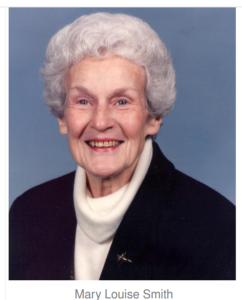Mary Louise Smith
By Mary Weaver

Mary Louise Smith was born in Eddyville, Iowa on October 6, 1914, an Iowa woman who broke glass ceilings in the State and the Nation.
She attended the University of Iowa earning a degree in social work administration. While there she met a medical student, and upon the completion of his studies they were married and moved to Eagle Grove, Iowa where he practiced.
Mary Louise, described as a moderate conservative, became active in Republican politics in Wright County and went on to assist in the regrowth of the Republican party following the Watergate scandal of 1974. President Gerald Ford named her the first female chair of the Republican National Committee, a post she held until 1977.
In 1973, Iowa established the Iowa Women’s Political Caucus. Among the founding members of the IWPC were Mary Louise Smith, Minnette Doderer, Jean Lloyd-Jones, Cristine Wilson, Louise Noun, Sonja Egenes, and Dagmar Vidal. A state-wide convention was planned and held in September of 1973. Six hundred and fifty persons attended. Workshop topics included lobbying strategies, help in running a campaign, rape laws, employment rights, welfare, and childcare.
The IWPC was founded as a bipartisan organization, with the goal of providing women with a political education and increasing women’s political participation and representation. In 1973, the IWPC released a report showing that women held only 6.7 percent of all elected offices in Iowa. The IWPC also worked for the passage of legislation, which benefited women, focusing on issues such as welfare, rape, sex discrimination, sex bias in education, the rights of homemakers, and equal access to credit and insurance.
This number has now risen to 41% for county elected offices in 2021, and is 30% in the State Legislature.
On a very personal note, I attended this conference as a 28-year-old. It was energizing to see this many women from both sides of the political spectrum together. I recall meeting and talking with Mary Louise for a time. Her crystal blue eyes permeated my soul and gave me activists values which I have carried to this day.
In 1977, she was inducted into the Iowa Women’s Hall of Fame.
In 1978, Mary Louise went on to serve as Co-Manager of the Committee for Governor Ray and was instrumental in the successful fourth re-election campaign for him.
One of her Republican female colleagues, former member of the Scott County Board of Supervisors and Iowa State Senator, Maggie Tinsman relates, “Mary Louise was never mean spirited. She helped to rebuild the Iowa Republican and National Republican party after it had diminished under Nixon and the Watergate scandal. She bridged women from all walks of life, encouraging communication between groups.”
She was a staunch advocate of the Equal Rights Amendment( go to link to learn about the turbulent history and lack of passage). With wide, bipartisan support (including that of both major political parties, both houses of Congress, and presidents Richard Nixon, Gerald Ford, and Jimmy Carter) the ERA seemed destined for ratification until Phyllis Schlafly mobilized conservative women in opposition.
In 1995, Iowa State University established the Mary Louise Smith Chair in Women and Politics in her honor. The purpose of the chair is to bring nationally renowned political leaders, scholars, and activists to Iowa State University to enrich the experiences of students and educate citizens about women in politics and their leadership roles in society. Since the fall of 1996, 35 women have visited campus as the recipient of the chair including Amy Klobuchar, Katie Porter, Pat Schroeder, Hillary Clinton, and Kathleen Parker.
Influenced by her husband’s experiences as a medic during the Vietnam War, Mary Louise became active in movements to establish a national peace institute. She was pleased when in 1991 President George H.W. Bush appointed her to the board of directors of the U.S. Institute of Peace. My long-time friend Ruth Kenney-Randolph recalls going to the funeral of Mary Louise. Honors and acknowledgements of her numerous awards and activities, were mentioned, including the U.S. Institute of Peace, as she was active with the USIP until her death in August of 1977.
An example of another Iowa woman who was instrumental in advancing women in our State and Nation.